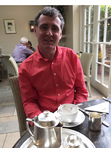Open City by Teju Cole – I Want To Be A Part Of It

Open City is a novel by Teju Cole, published in 2011.
I didn’t know what to expect when I borrowed Open City from the library. I’d discovered that Teju Cole was, amongst other things, a writing professor at Harvard. What would a book by a Harvard writing professor look like? Fancy, I thought. Would it be the kind of fancy that makes the reader feel fancy too, or the kind that makes them feel inadequate?
I started reading. Julius is a young doctor working in a New York psychiatric hospital. He has recently split up with his girlfriend. When off duty he listens to classical music, reads high-end literature, or goes for long walks in the streets of New York, visiting cultural sites. His mind drifts over his German/Nigerian childhood. He takes a holiday in Belgium with the vague hope of finding a lost grandmother. Returning to New York, he wanders round some more, gets mugged, learns something dark about his past, and goes to a concert.
Open City is not driven by plot – clearly. Instead it’s a book of thoughts and ideas, with its central preoccupation being identity. As a man who is part Nigerian, part German, Julius seems to be looking for a place in the world.
The book defines identity in all kinds of ways – by race, ethnic group, religion, age, even by the particular illnesses an individual might suffer. Actually, you could also define identity by the books you read. If reviews on Goodreads are anything to go by, people who like Teju Cole’s Open City form their own little tribe, cutting across international borders. This is one of a huge overlapping Venn diagram of identities. I put myself in the Open City admirers group. Others may not feel it’s a place for them, preferring cosy crime maybe. But then again, there will almost certainly be Open City readers and cosy crime readers who share the experience of having, for example, eczema. This is a book where we are all divided in some ways, while overlapping in others. I would suggest giving Open City a chance. It’s clever, but not in a way designed to make readers feel small. Yes there’s name dropping of European authors, and attendance at performances of Mahler symphonies given by the Berlin Philharmonic under Simon Rattle. But even if this is not apparently your thing, I think you will still find some common ground somewhere in Open City.
One last point. I enjoyed the way Cole set the story at a time when the world of books is changing. Julius goes to bookshops just before they go out of business – record shops too. This is the moment when the old analogue culture goes digital. This shift serves to break up human contact, ending the physical experience of going to a shop with other people. There is a definite sense of loss. At the same time, there are new potentials for communication. Back in the heyday of bookshops this review would never have been written. I would have had to leave it to someone working for the Times Literary Supplement or The Guardian. Now anyone can put their review of Open City out there, and look to overlap with someone else’s literary Venn diagram.
My advice would be to consider joining the Open City tribe. In fact, in one way or another, you’re already a member



